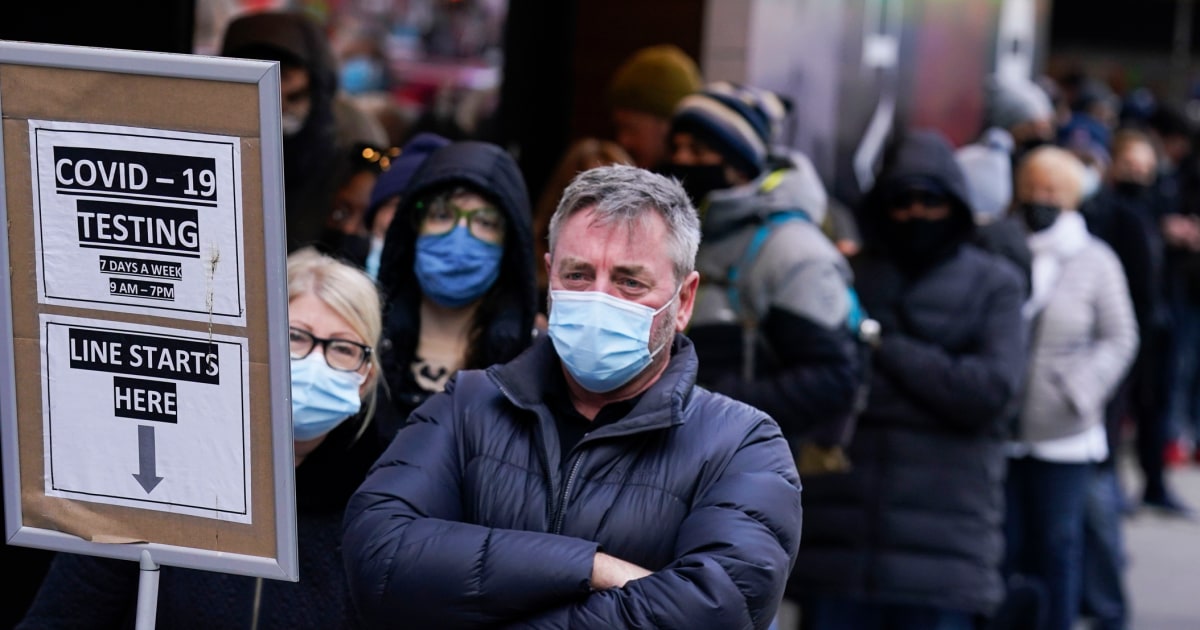
New York City, once the epicenter of the pandemic in the U.S., is hearing some unwelcome echoes of 2020.
Newly reported Covid-19 infections rose sharply this week. Testing sites across the city once again had long lines. Outbreaks forced some schools to move final exams online. A spate of Broadway shows canceled performances.
The city averaged 2,899 confirmed cases each day over the past week, according to the city Department of Health and Mental Hygiene. That’s up from a daily average of around 1,800 cases over the past 28 days.
Dr. Jay Varma, a professor at the Weill Cornell Medical School and a senior adviser to Mayor Bill de Blasio, said the percentage of people testing positive doubled in just three days over the past week.
“Um, we’ve never seen this before in #NYC,” Varma tweeted Thursday.
Cases and hospitalizations are also increasing statewide. On Thursday, the state Health Department reported 18,276 new cases from the previous day, the most since mid-January.
Gov. Kathy Hochul said this week that hospitalizations in the state are up by 70 percent since Thanksgiving. The number of Covid cases per 100,000 people has jumped by 58 percent during the same period, she said.
Dr. Bruce Y. Lee, a professor of health policy and management at the City University of New York, said that the shift most likely owes to rising anxiety over the omicron variant but that it also signals the start of a dreaded winter surge that health experts had warned could play out again this year.
“There’s definitely been a change in perception and concern over the past few days,” he said.
The U.S. experienced a wave of infections after Thanksgiving 2020 that continued through the winter months. Lee said falling temperatures, increased travel and gatherings over the holiday season could fuel another rise in cases.
“If you combine all those things, independent of the omicron variant, you have a setup for a potential winter surge,” he said. “Then you throw omicron on top of that, and you could potentially see things spread even faster.”
Several Broadway shows canceled performances this week because of Covid infections among cast or crew members, including the musicals “Mrs. Doubtfire,” “Tina,” “Hamilton” and “Ain’t Too Proud.”
The recent increase in cases appear to be straining testing resources around the city, with New Yorkers posting complaints about long lines at clinics and other testing sites to social media.
The mayor’s office announced Thursday that more mobile testing sites will be set up around the city and that capacity will be expanded at existing locations to meet the increased demand. De Blasio added that 500,000 free rapid at-home tests will be distributed through community organizations.
The current wave of infections prompted New York University to cancel all “nonessential” in-person gatherings. In an announcement Wednesday, university officials recommended that final examinations and assessments be moved online and announced that the use of residence lounges, meeting spaces and athletic facilities would be suspended.
There were similar moves elsewhere in the state and throughout the Northeast. Cornell University in Ithaca, New York, canceled in-person gatherings this week and shifted to online exams. And in neighboring New Jersey, Princeton University moved its final exams online.
Lee said the current wave is most likely a mix of the lingering delta variant and the new, fast-spreading omicron variant. While preliminary studies suggest that the omicron variant may cause less severe illness than the delta variant, Lee said it is still cause for concern. For one thing, research into the risks of the omicron variant is still underway, and it may be too soon to know what effect it has on hospitalizations and deaths.
“When we saw milder, we don’t mean this is a soft and cuddly variant,” he said. “If it is milder, that doesn’t mean it can’t still cause severe outcomes.”
Lee urged people to get vaccinated or get their booster shots as soon as possible and said people should keep wearing masks and practicing social distancing indoors and in crowded public places. He also recommended limiting unnecessary travel and gatherings over the winter months.
“We have to keep in mind that we’re not asking people to do this forever,” he said. “It’s just very crucial during these winter surge months.”
Elliott Ramos contributed.
Source: | This article originally belongs to Nbcnews.com










